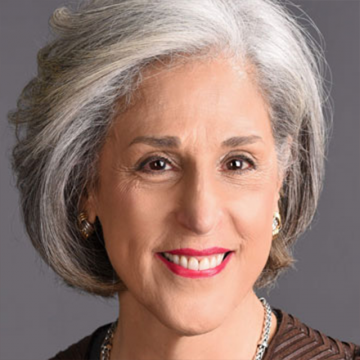
“My father [taught me] that I could do anything or be anything. He never gave me the sense that, because I was a girl, I was limited in any way,” says Michele Forzley ’73. “It didn’t really register to me that Simmons was a women’s school,” she recalls, “that’s not what drew me to it.” Having begun her undergraduate studies at Boston University, Forzley knew that a smaller college would be a better fit.
A working student while studying Sociology at Simmons, Forzley went to the New England School of Law after graduation. “I fell in love with law,” she says, “and became more aware of different areas of law that were out there, and my attraction to certain subjects, especially international law.” After taking the Bar Exam in 1976, she bought a bicentennial plane ticket. “For $200, you could fly anywhere in the country as many times as you wanted within 90 days, as long as you didn’t come back to the city where you started.”
From working student to private practice
Eventually, Forzley ended up in New York City working at Merril Lynch, an investment management company, first as a research assistant and then as a stockbroker. Trained in finance and investments, Forzley was admitted to the Massachusetts and New York Bar and started her own private practice. “On my 27th birthday I opened my law office. It was 200 square feet with a window facing Madison Avenue.” A friend in bookkeeping joined her to represent stockbrokers. “That was how I began my practice. I understood how to raise money on Wall Street. I started working internationally, before a lot of American companies were doing so.”
Though she was yet to pursue public health in her career, Forzley became aware of relevant issues. In the early 1980s, NYC was one of the epicenters of the AIDS crisis. “It made no sense to me why it was so difficult for people to get AIDS drugs,” she recalls. “A friend of mine died, and another friend who contracted the disease was wealthy and connected enough to receive drugs and the best medical care in NYC.” This disparity in healthcare stuck with Forzley throughout her career.
Launching a new career combining law, international business and public health
While her work expanded in international business development, Forzley closed her New York office and worked remotely in Massachusetts, until the U.S. government started offering similar consulting services for free. “It was hard to compete with free services,” she says. “I took time to reorient myself. What I was thinking of doing didn’t have a name then. I thought of it as an international health lawyer. The Bar didn’t have a category for this type of law. I was familiar with public international law, but it didn’t have a category in the health sector. To explore options, she took classes at the Harvard School of Public Health, eventually getting her Master’s from Johns Hopkins’ Bloomberg School of Public Health as it became clear that she could be more relatable in the health world with a health degree.
“That’s how I launched my new career,” says Forzley. Her earliest projects included serving as legal advisor to the Partnership for Supply Chain Management, funded in relation to the U.S. President's Emergency Plan for AIDS Relief (PEPFAR), a fund created by President George H. W. Bush, that shipped AIDS medication around the world. “We had $15B worth of AIDS drugs and had to get them where they were supposed to go. It was like an international business transaction, but in the field of public health.” Forzley also did grant work and wrote a paper about counterfeit medicine, as well as work with the World Health Organization (WHO) and the World Bank.
“In 2007 I was hired to do an assessment of the medicines supply chain in Albania, identifying points of corruption,” says Forzley. When she submitted her report to the World Bank, she was asked how she was able to pinpoint these issues. “Follow the money; that leads you to who is hiding, stealing, and pocketing. I had been working in international business transactions and I understood it. Public health people understood the doctor-patient dynamics, but not the business side.” Since then she has been tapped to do assessments of laws in the health sector for potential reform. “My unique specialty combines business knowledge and public health. Healthcare is a business.”
Gaining a sense of self at Simmons
As for Forzley’s Simmons experience, it mirrored her father’s limitless outlook. “Simmons gave me a sense of self, that there were no walls I couldn’t climb,” says Forzley. Case in point: while at Simmons she wanted to join the International Trade Club of Boston, where the law committee was filled with general counsel from companies across Boston. “I naively called to join and was told that they didn’t allow women. I called the chair of the law committee and said, I’m a law student and want to do international law. He said, you’re right, they won’t let you join because you're a woman, but I’ll invite you as a guest to our meeting.”
When she told her professor about the opportunity, she was advised to go prepared with subjects to discuss. “I asked where their daughters went to school,” she recalls, “and I told them about Simmons, and how I was going to law school. [I learned that] I could actually be with these professional men and be okay, that my course of action was to help them be comfortable with me.”
Looking back, Forzley can see the role the Simmons community has played in her career. “Simmons was a cheering squad. I needed that boost to my ego to sense that I was going to be okay in the world,” she says. “It was hard to be a student and work as much as I did. I was exhausted most of the time, and their cheering gave me the ability to survive those years. I didn’t have that in law school, but my Simmons experience gave me enough of a booster shot that I was able to make it through.”

